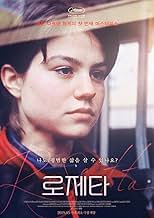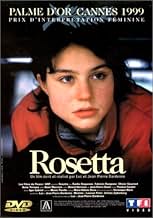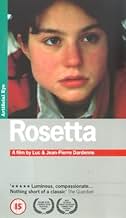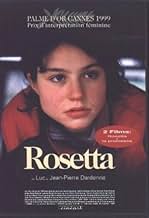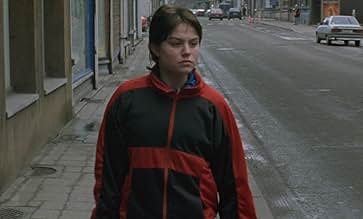Rosetta
- 1999
- Tous publics
- 1h 35m
IMDb RATING
7.4/10
17K
YOUR RATING
Young and impulsive Rosetta lives with her alcoholic mother. Moved by despair, she will do anything to maintain a job.Young and impulsive Rosetta lives with her alcoholic mother. Moved by despair, she will do anything to maintain a job.Young and impulsive Rosetta lives with her alcoholic mother. Moved by despair, she will do anything to maintain a job.
- Directors
- Writers
- Stars
- Awards
- 10 wins & 7 nominations total
Leon Michaux
- First Policeman
- (as Léon Michaux)
- Directors
- Writers
- All cast & crew
- Production, box office & more at IMDbPro
Featured reviews
10MikeF-6
This small Belgian film was the unexpected winner of the Palme d'Or at Cannes during the year when David Cronenberg and his panel of contrarians ruled. Because other, more popular films ("All About My Mother," "L'Humanité," "The Straight Story") were passed over, "Rosetta" has received a reputation as an undeserved winner. I am here to proclaim it a great film and a worthy addition to anyone's Best list. I have not researched whether or not the director of "Rosetta" set out adhere to Dogma 93 principles, but many of them are present no movie makeup, natural light, natural locations, no soundtrack music, and hand held cameras. The camera follows one person the title character so that just about every shot is either of her or from her point of view. Rosetta lives with her alcoholic prostitute mother in a camping trailer at a run down campground called The Grand Canyon. She is in her late teens, doesn't have any friends (except one she meets during the course of the story) or even communicates much with other people, and is only interested in getting a regular job and living a normal life. In a remarkable episode, we see her in bed just before going to sleep. She is having a conversation with herself that goes, "You have a job. I have a job. You have a friend. I have a friend. You have a normal life. I have a normal life. Good night. Good night." Rosetta is played by Émilie Dequenne (who won Best Actress at Cannes). She is so good, so natural, so much *Rosetta* that, along with the photographic technique, she gives the material a documentary feel. One reviewer even called her a "non-actor" as if she were not a professional actress (this is her first movie role) and had been picked right out of that campground to play her own life. The film goes by quickly even as the plot unfolds slowly. We follow Rosetta as she travels her city by foot and bus looking for work, catching fish to eat from an urban river, and tentatively letting one other person into her routines. Sometimes character motivation may seem murky, but it is a thrill, later, when you realize what was really going on. If I remember correctly, there is only one brief dialog exchange near the end where one person explains plot points to another for the audience's benefit. The ending is a tender moment that may indicate a new stage in Rosetta growth. Highly recommended. A beautiful and deeply felt film.
The Dardenne brothers were not incorrect when they called their Palme D'Or winning work "a war film.". It is an unremitting portrayal of the most dire hardships, centred around Rosetta (Emilie Dequenne), a young, spirited girl who battles with desperate tenacity to find a job and not so much escape as merely survive in her surroundings. Her life is a bleak struggle for subsistence in a world devoid of tenderness, in which her mother (Anne Yernaux), a quasi-prostitute more concerned with the source of her next drink than her daughter, stands as an example of the potential results of such continued deprivation. When she is befriended by a waffle vendor (Fabrizio Rongione), her prior existence leaves her unsure of how to act in the presence of an affectionate, concerned face, and when he attempts to teach her to dance, she can do no more than move jerkily without rhythm, uncomfortable in the arms of another human. The arisal of an opportunity to take his job forces Rosetta to confront whether physical necessity can ever be an excuse for the betrayal of others.
What follows is a superbly wrought piece of social realism, unsentimental in its examination of the dehumanising effects of poverty. For Rosetta and many others in analogous situations of the most dire physical hardship, their material deprivation leads to an erosion emotional and mental qualities. The Dardenne brothers' ruthless directional style, laced with close-ups and unpleasant details, tangibly conveys the dirt and drudgery of Rosetta's impoverished life. Indeed, the film is palpably cold, almost painfully explicit in its depiction of an uncaring world. In addition, Dardenne's performance, for which she won the Best Actress Award at Cannes, brings to life with understated excellence her fight, not to live well, but simply to survive by any means in a world that, for her, contains few hopes and no love.
The Dardenne brothers make no excuses or apologies for their presentation of Rosetta's base strivings, delivering a film that charts how far individuals can fall. Consistently raw and at times brutal, the film nevertheless proposes no answers, expects no sympathy, it merely conveys and evokes with a clear, uncompromising eye the bleak struggle for existence that is, for some, the total of what life has to offer. Harsh, but utterly compelling viewing.
What follows is a superbly wrought piece of social realism, unsentimental in its examination of the dehumanising effects of poverty. For Rosetta and many others in analogous situations of the most dire physical hardship, their material deprivation leads to an erosion emotional and mental qualities. The Dardenne brothers' ruthless directional style, laced with close-ups and unpleasant details, tangibly conveys the dirt and drudgery of Rosetta's impoverished life. Indeed, the film is palpably cold, almost painfully explicit in its depiction of an uncaring world. In addition, Dardenne's performance, for which she won the Best Actress Award at Cannes, brings to life with understated excellence her fight, not to live well, but simply to survive by any means in a world that, for her, contains few hopes and no love.
The Dardenne brothers make no excuses or apologies for their presentation of Rosetta's base strivings, delivering a film that charts how far individuals can fall. Consistently raw and at times brutal, the film nevertheless proposes no answers, expects no sympathy, it merely conveys and evokes with a clear, uncompromising eye the bleak struggle for existence that is, for some, the total of what life has to offer. Harsh, but utterly compelling viewing.
I found this film quite effecting without ever straying into crass sentimentality. Rosetta is a young girl who is full of anger and yearning. She lives with a dysfunctional alcoholic mother in a caravan park. Little is given about her past but we can understand that due to her upbringing she has limited options available to her. Her desire to be find a job (any job) is both desperate and touching. For Rosetta the prospect of a job, even a job that many in middle class society (indeed the average art house cinema goer!) might regard as mundane and without prospects, represents to her a chance to escape the existence on the outskirts of society. Her drive however raises her above the mere status of victim, and it is a credit to the lead that she conveys so much of this, without it having to be spelt out.
One thing I did find a little disconcerting was the wobbly camera technique, don't see if you are feeling a little nauseous as I was however this is only a minor criticism. Its around 90 minutes and I think well worth the investment if you like a good character based movie.
One thing I did find a little disconcerting was the wobbly camera technique, don't see if you are feeling a little nauseous as I was however this is only a minor criticism. Its around 90 minutes and I think well worth the investment if you like a good character based movie.
I saw "Rosetta" several weeks ago - and I still fail to recall any movie which could convey such an immediate sense of being pysically there, all the time along Rosetta's everydays' "war". We are bombarded and flooded with images 16hours per day, it takes great stregth of vision, of images, atmosphere and characters to grab at you this effectively in year 2000! Rosetta struck my as a very real encounter, with all the nonsense and ups / down of real events and life... It made me feel more of life, made me think of it more often and more intensely, it made me look into more eyes than I did before... Thank you, Luc and Jean-Pierre! and thank you, Emilie and all!
This is beyond the intensity of Gary Oldman's "Nil By Mouth", and Tim Roth's "The War Zone", while Erick Zonca's "Dreamlife of Angels" seems heavenly compared to the conditions presented in "Rosetta" by Luc and Jean-Pierre Dardenne.
A down right harsh film. Unsparingly direct depiction of a young girl's poverty struggle. She is as tough as she can be. She fights vigorously to hang on to a job. She cares for her mother, a helpless alcoholic, and a seamstress when not drunk. Rosetta (Emilie Dequenne) is unrelentingly stubborn about receiving kindness, or food unsolicited. She has her dignity. A young person with so much burden on her shoulder and a heavy heart.
Things may be seemingly repetitive: again and again we see her crossing that traffic roadway, jumping into the bush trail; we hear the rustling leaves, the thumping of her footsteps; we watch her stopping by the hideout where she kept her rubber boots, changing her only good pair of working shoes; we follow her as she crawls through the wire fence loophole, arriving at the campers -- feels like a mindless routine. Yet, she's intensely single-minded on getting "a real job" (vs. moonlighting) and to have "a normal life", not to "fell into a rut". At one point, we can almost be happy for her to have "found a friend" in Riquet (Fabrizio Rongione), a waffle street van vendor. She actually was able to peacefully sleep that night. Only to wake up and report at work to be told she's again out of a job. A devastating blow. Out of desperation, she did something that most of us viewers may not be able to comprehend -- but what do we know of her travails, who are we to judge her action?
It was not easy for her to have done what she did -- she did hesitate and took the risk. She risked her newfound friendship -- she desperately needed "to have a job". In a way, she has lack tenderness, love and warmth for so long that she's numb to human kindness -- she needs to be thawed! One has to be patient with her, to give her time and see through her tough surface and rekindle her heart. Trust needs to be rebuilt for her to continue living and tackle difficulties afresh!
This is no Hollywood fare. Dialogs are few. No exploitative, explosive, abusive scenes. We're given the bare structure of the story, and Rosetta, plus the sparing few supporting characters, held the movie steadily intact.
A down right harsh film. Unsparingly direct depiction of a young girl's poverty struggle. She is as tough as she can be. She fights vigorously to hang on to a job. She cares for her mother, a helpless alcoholic, and a seamstress when not drunk. Rosetta (Emilie Dequenne) is unrelentingly stubborn about receiving kindness, or food unsolicited. She has her dignity. A young person with so much burden on her shoulder and a heavy heart.
Things may be seemingly repetitive: again and again we see her crossing that traffic roadway, jumping into the bush trail; we hear the rustling leaves, the thumping of her footsteps; we watch her stopping by the hideout where she kept her rubber boots, changing her only good pair of working shoes; we follow her as she crawls through the wire fence loophole, arriving at the campers -- feels like a mindless routine. Yet, she's intensely single-minded on getting "a real job" (vs. moonlighting) and to have "a normal life", not to "fell into a rut". At one point, we can almost be happy for her to have "found a friend" in Riquet (Fabrizio Rongione), a waffle street van vendor. She actually was able to peacefully sleep that night. Only to wake up and report at work to be told she's again out of a job. A devastating blow. Out of desperation, she did something that most of us viewers may not be able to comprehend -- but what do we know of her travails, who are we to judge her action?
It was not easy for her to have done what she did -- she did hesitate and took the risk. She risked her newfound friendship -- she desperately needed "to have a job". In a way, she has lack tenderness, love and warmth for so long that she's numb to human kindness -- she needs to be thawed! One has to be patient with her, to give her time and see through her tough surface and rekindle her heart. Trust needs to be rebuilt for her to continue living and tackle difficulties afresh!
This is no Hollywood fare. Dialogs are few. No exploitative, explosive, abusive scenes. We're given the bare structure of the story, and Rosetta, plus the sparing few supporting characters, held the movie steadily intact.
Did you know
- TriviaContrary to popular belief, the film did not inspire a new so-called "Rosetta Law" in Belgium that prohibited employers from paying teen workers less than the minimum wage and included other youth labour reforms. In a Guardian interview with the Dardenne brothers, Jean-Pierre explained the misconception: "No, that law already existed, it just hadn't been voted through yet. The truth is always less interesting than the fiction."
- GoofsWhen Rosetta is giving her mother money for a water bill she is wearing a jacket with the sleeves fully extended. However in the next immediate cut when she goes outside the sleeves are rolled up.
- SoundtracksSomething New
- How long is Rosetta?Powered by Alexa
Details
- Release date
- Countries of origin
- Official site
- Language
- Also known as
- Розетта
- Filming locations
- Production companies
- See more company credits at IMDbPro
Box office
- Gross US & Canada
- $266,665
- Opening weekend US & Canada
- $20,187
- Nov 7, 1999
- Gross worldwide
- $293,092
Contribute to this page
Suggest an edit or add missing content


![Watch Bande-annonce [OV]](https://m.media-amazon.com/images/M/MV5BOWY4MGMzYTItZjQwOS00MmVhLWE0MDYtMGZmYmFjNTkyYTU2XkEyXkFqcGdeQXRyYW5zY29kZS13b3JrZmxvdw@@._V1_QL75_UX500_CR0)


